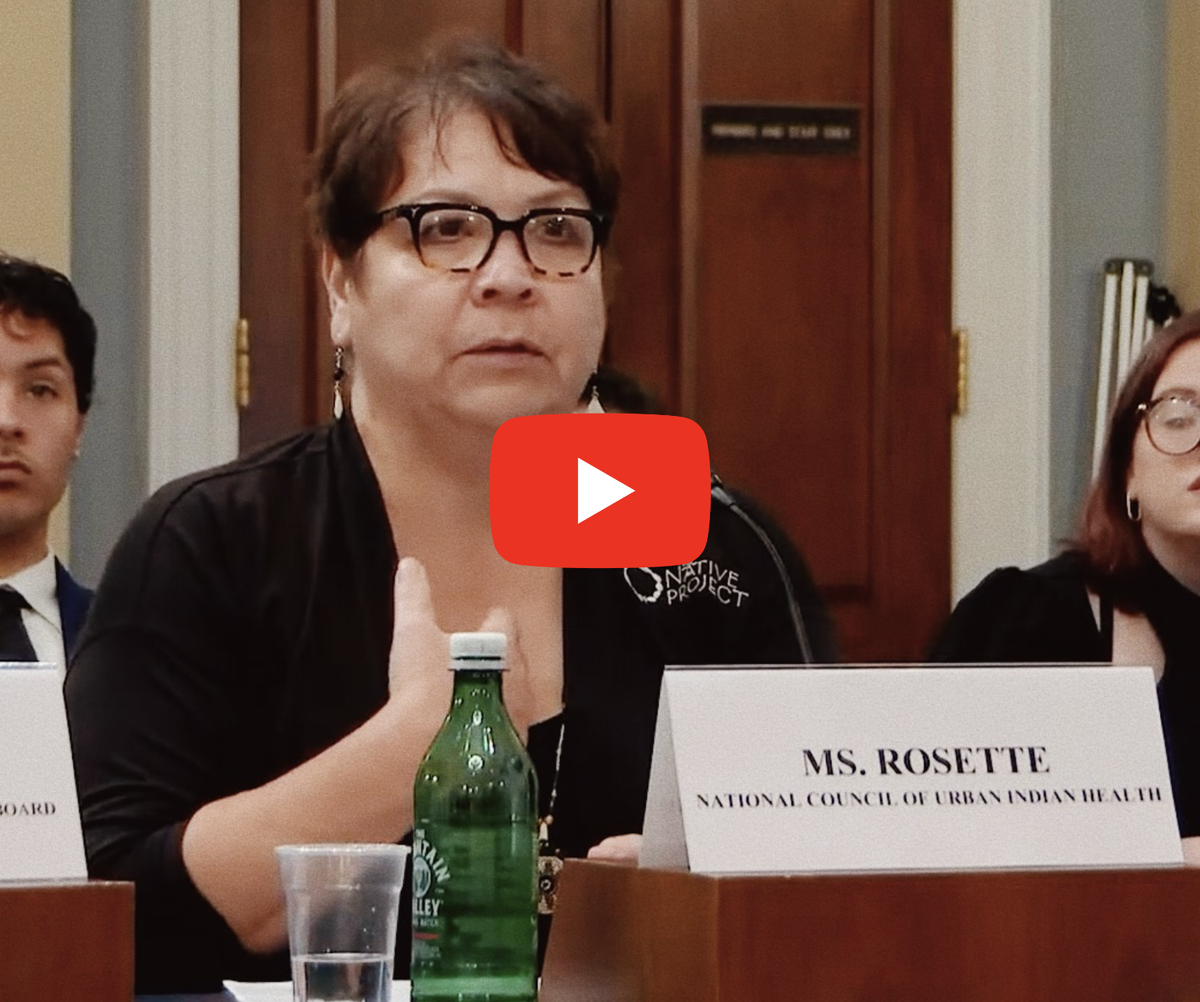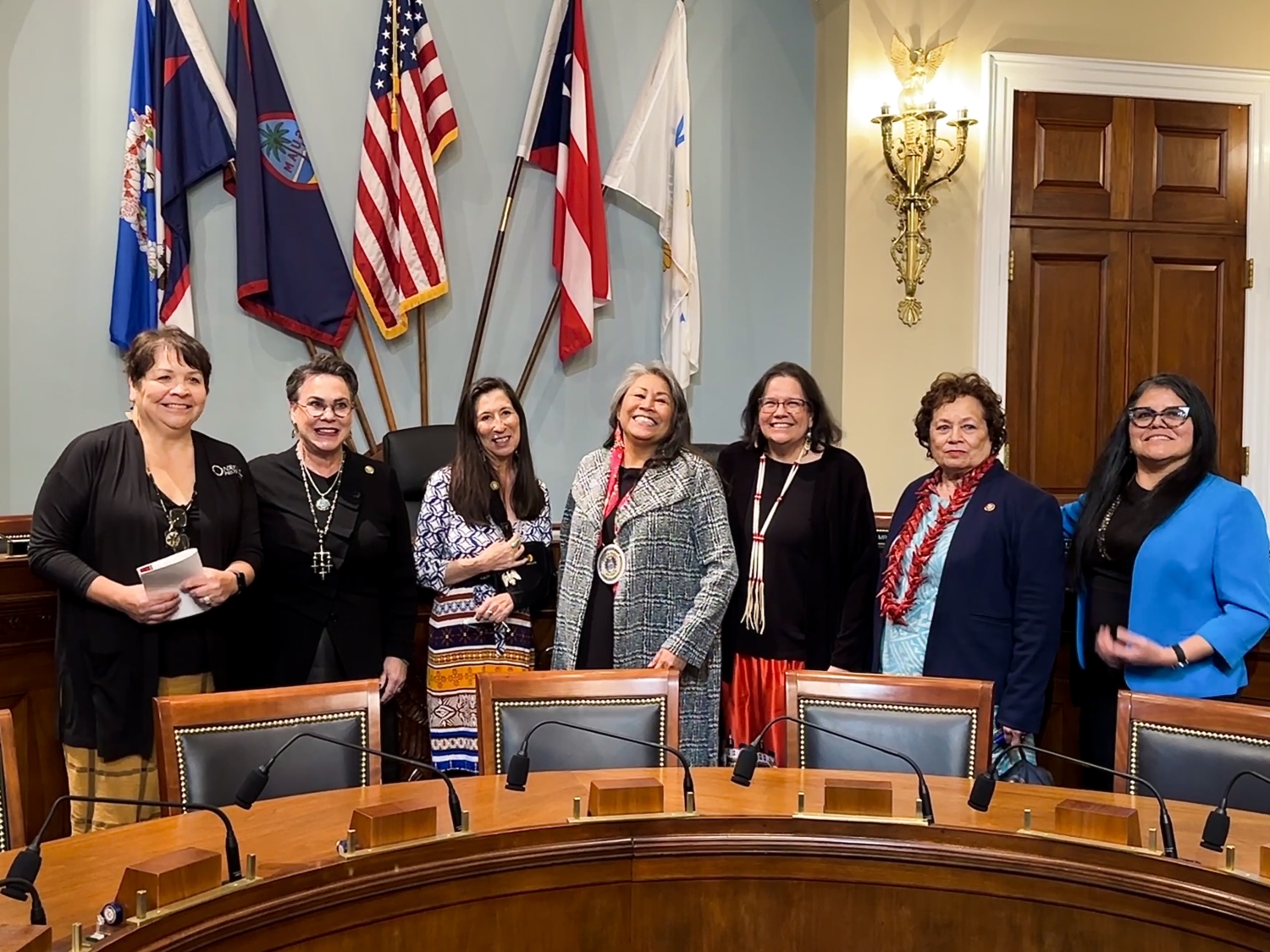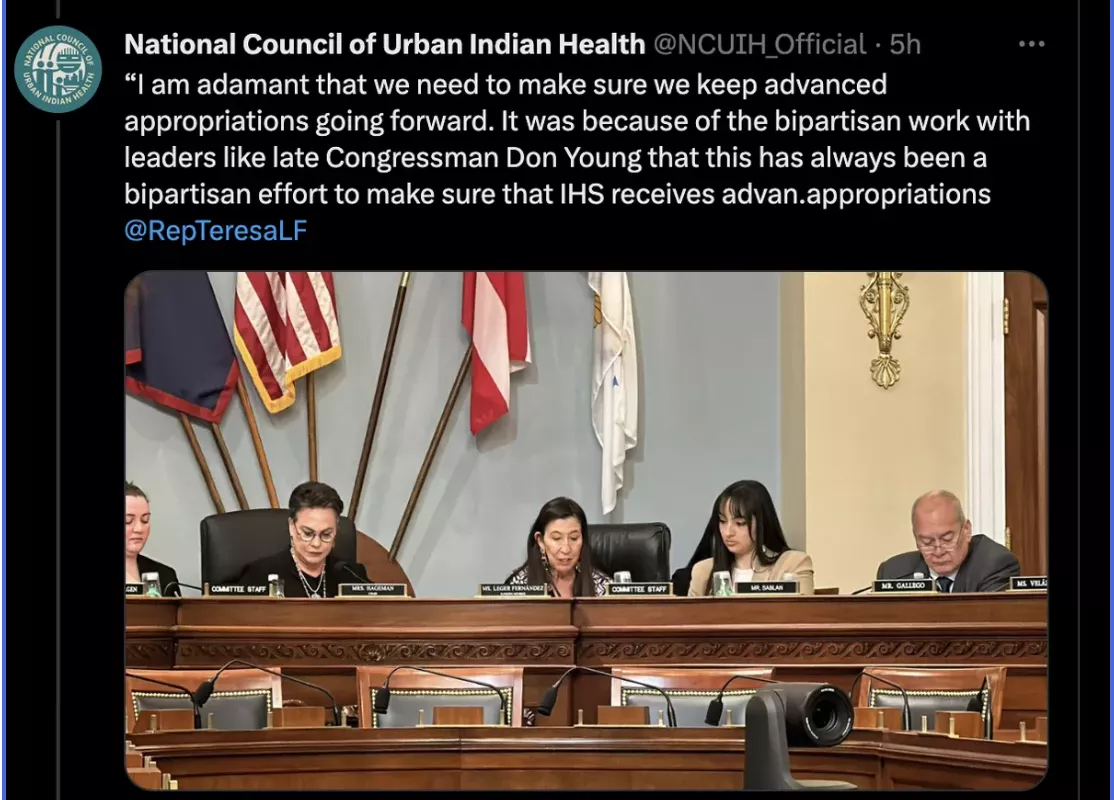NCUIH Testifies Before House Oversight Committee on Improving Healthcare Delivery for Native People
The National Council of Urban Indian Health (NCUIH) Board Member and Chief Operations Officer (COO) of the NATIVE Project, Maureen Rosette (Chippewa Cree Nation), testified before the House Natural Resources Subcommittee on Indian and Insular Affairs oversight hearing titled “Challenges and Opportunities for Improving Healthcare Delivery in Tribal Communities.”
NCUIH Testifies at Congressional Hearing on Tribal Healthcare Delivery and Funding for IHS

NCUIH Board Member and COO of the NATIVE Project, Maureen Rosette (Chippewa Cree Nation), testifies before the House Natural Resources Subcommittee on Indian and Insular Affairs.
On Wednesday, March 29, NCUIH Board Member and NATIVE Project COO, Maureen Rosette, testified before the Subcommittee on Indian and Insular Affairs in their oversight hearing titled “Challenges and Opportunities for Improving Healthcare Delivery in Tribal Communities.”
- Additional witnesses included: Ms. Janet Alkire, Board Member
of the National Indian Health Board, Ms. Jerilyn Church, Executive Director of the Great Plains Tribal Leaders Health Board, and Ms. Laura Platero, Executive Director of the Northwest Portland Area Health Board.
What they’re saying:
-
In her opening remarks, Chairwoman Harriett Hageman (R-WY- AL) reaffirmed the trust and treaty obligation to Native health care, stating that “the federal government has taken upon itself to provide for the care of American Indians and Alaska Natives.”
-
Rosette emphasized the importance of the Indian Health Service (IHS) and urban Indian organizations (UIOs) to the Indian health system in providing health care to Native people.
“I lived and grew up on my reservation and I was a consumer of my own Tribally-operated health program at the age of 28. I moved to Spokane to go to law school. I had no health insurance. I had two little kids, a three-year-old and a five-year-old and we had no health insurance. At the time, if NATIVE Project had medical services, we would at least had access to health care, but we didn’t at the time. I just hoped and prayed that none of us got sick. Now, I have insurance and can go anywhere I want, but our family has chosen to be consumers of NATIVE Project because of the excellent healthcare we get there. And it’s culturally appropriate, that’s what we want. Today, there are 41 UIOs, which are a fundamental and necessary component of the Indian health system, and we work hand in hand with IHS to help provide the resources necessary to provide healthcare to Native people.”
-Maureen Rosette, NCUIH Board Member and NATIVE Project COO
The importance of care for Native people by Native people was also reiterated in the hearing including by Ms. Laura Platero:
“While American Indian and Alaska Native people were disproportionality impacted by COVID-19, due to underlying health disparities and the lack of infrastructure in many communities, Tribal innovation and response to COVID prevailed. When Tribes are given the resources and the control of those resources, they know how to respond to meet the needs of their community.”
-Laura Platero, Executive Director, Northwest Portland Area Indian Health Board
The bottom line: The IHS including UIOs are a critical resource for Native people to access healthcare services.
Proposed Cuts to IHS Funding Risks Native Lives
Rosette, along with fellow witnesses, provided valuable insight into the realities that Native communities experience at home in their call for more reliable funding for IHS.
-
Addressing Challenges: The shortage of healthcare professionals and facilities in rural and urban areas, coupled with the difficulty recruiting and retaining them, makes it difficult for patients to access quality healthcare. The lack of adequate resources, poor infrastructure, and low salaries have resulted in a shortage of healthcare professionals in these areas. Native leaders spoke about the importance of supporting Native healthcare administrators in their effort to be innovative and creative care providers for their people.
“Congress must live up to its treaty commitments, bring IHS facilities to modern standards, and increase IHS funding. After this hearing, I will return home to our financially starved IHS hospital covered in snow and running on boiler heat in below-freezing temperatures. I will give all my time and energy to help my people in need, working my vision for a new medical facility… I will be waiting for this subcommittee and Congress to finally take action, Congress must pay its overdue debts and provide American Indians and Alaska Natives the healthcare we deserve and the healthcare we were promised.”
-Janet Alkire, National Indian Health Board
Advanced funding for IHS is needed to provide stable and predictable funding to ensure the continuity of care for American Indian and Alaska Native people.
“Advance Appropriations will now allow IHS to make long-term cost-saving purchases and minimize the administrative burdens for the agency and UIOs. It will also improve accountability and increase staff recruitment and retention at IHS. When IHS distributes its funding on time, our UIOs can pay their doctors and providers- giving Native people the access to care and services they need to be thriving communities.”
-Maureen Rosette, NCUIH Board Member and NATIVE Project COO
What they’re saying:
“GOP proposed cuts to IHS would have to reduce outpatient services by nearly 1.6 million visits. 1.6 million visits will go away. Dental visits would be reduced by 120,000, mental health visits by nearly 90,000 and outpatient services by 4,000.”
–Rep. Leger Fernandez. (D-NM-3)
Go deeper:
Next Steps: The Committee is expected to review the testimony as they propose oversight legislation related to the Indian Health Service this year. NCUIH will continue to advocate for full and flexible funding for the Indian Health Service.







Leave a Reply
Want to join the discussion?Feel free to contribute!